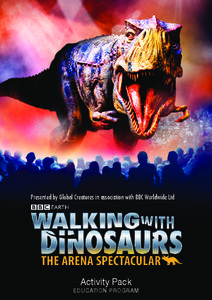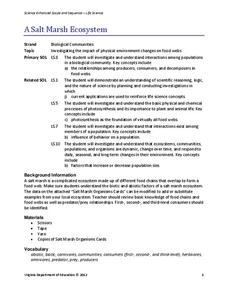Virginia Department of Education
Predator-Prey Simulation
Do your pupils have the misconception that environmental predators are "bad" and harm smaller creatures? The simulation explains, in detail, the important role predators play in maintaining a stable ecosystem. Through web-based research,...
Howard Hughes Medical Institute
Creating Chains and Webs to Model Ecological Relationships
The sustainability of an ecosystem depends on many factors and changes constantly. Young scholars consider these factors as they use a set of cards to create food webs. They review key scientific vocabulary such as predator, prey,...
National Science Teacher Association
Middle School Sampler: Science
Focus on inquiry-based learning in your science class with a series of activities designed for middle schoolers. A helpful packet samples four different texts, which include activities about predator-prey relationships, Earth's axis...
Howard Hughes Medical Institute
Look Who's Coming for Dinner: Selection by Predation
What happens when a new predator comes to town? Learners analyze an experiment that studies the effect of predation on selection. They use real data to draw conclusions about the impact a new predator has on a prey species.
Consortium for Ocean Science Exploration and Engagement (COSEE)
Life in an Ocean World
How does the shell color of crabs and the habitat they live in impact the predator-prey relationship? The fourth lesson in a series of five is a game where participants try not to get eaten if they are a prey and try to eat if they are...
Nature Works Everywhere
Sharks and Shorelines
Examine predator-prey marine relationships through an interactive lesson plan design. Learners begin by studying a specific shark species and then analyze real-time shark-tracking data. They also study threats to shark populations and...
EngageNY
Continued Close Reading of Bullfrog at Magnolia Circle: Text-Dependent Questions and Vivid Words and Phrases
As 3rd graders continue reading Bullfrog at Magnolia Circle, they focus on the concepts of predator and prey in the fifth lesson plan of this unit. Scholars further develop their ability to answer questions using evidence from the text...
Science 4 Inquiry
Frenemies, Bros and Killers: A Lesson in Symbiosis
Animals and plants develop relationships and rely on each other to survive. Pupils learn more about symbiosis through a video, a hands-on matching activity, and a game. They differentiate and describe each type on a written evaluation.
National Park Service
Living & Non-Living Interactions
What better way to learn about ecosystems than by getting outside and observing them first hand? Accompanying a field trip to a local park or outdoor space, this series of collaborative activities engages children in...
Howard Hughes Medical Institute
Modeling Food Webs in Darién, Panama
It's a jungle out there! Young biologists journey to Darien, Panama to examine the intricate relationships between the organisms that inhabit the jungle. Groups begin by demonstrating an understanding of energy flow in ecosystems, then...
K20 LEARN
Ecosystems, Human Activity, And Interactions, Oh My!: Human/Environment Interaction
Word clouds about ecosystems hook learners into a lesson that explores Yellowstone wildlife. Young scientists create cause-and-effect relationships after examining data and recommend solutions to their observed problems. More data...
Wilderness Classroom
Ocean Life
Our oceans are composed of many complex relationships. Young oceanographers explore relationships between organisms, understand the world ocean's currents, and discover the effects of water pollution and how it behaves. There are...
National Wildlife Federation
Who Is Faster?
Am I going to catch it? Individuals time how long it takes them to walk, jog, and run a given distance and calculate their speed. They then research two animals and find their speeds. Using a chart, pupils compare the speeds of the...
Illustrative Mathematics
Foxes and Rabbits 2
The fox population chases the rabbit population. Groups model the populations of foxes and rabbits with two trigonometric functions. Individuals graph both trigonometric models on the same graph, and then teams determine an explanation...
BBC
Walking with Dinosaurs
Breath new life into your class's study of dinosaurs with this extensive collection of materials. Offering everything from a printable T-rex mask, word searches, and connect-the-dots activities to informational handouts, hands-on...
Illustrative Mathematics
Foxes and Rabbits 3
Model periodic populations. Here, in the context of foxes and rabbits, pupils look at graphs of the populations of these animals in a national park over a span of 24 months. Groups analyze the graphs and determine trigonometric...
Virginia Department of Education
A Salt Marsh Ecosystem
What a web we weave. Pupils use yarn as the primary resource to create a web depicting the intricacies of a salt marsh ecosystem. They participate in a question and answer session, which leads to an in-depth facilitated discussion...
Consortium for Ocean Science Exploration and Engagement (COSEE)
Arctic Smorgasbord
Though the walrus spends roughly one third of its time on land, it eats organisms that live on the bottom of the ocean. The first in a series of five, the lesson uses a variety of plant and animal cards to have scholars build an arctic...
Montana Natural History Center
Studying Grassland Ecosystems
At first glance, grassland ecosystems might seem dull and uninteresting, but once you start to explore it's amazing the things you'll find! Through this series of engaging lessons, activities, and experiments, elementary students examine...


















